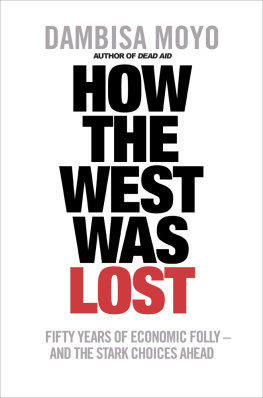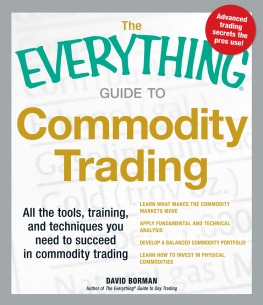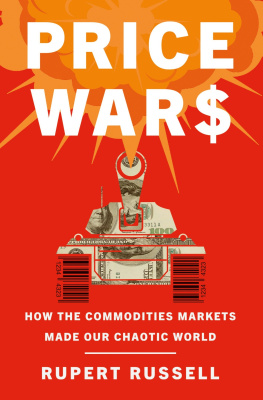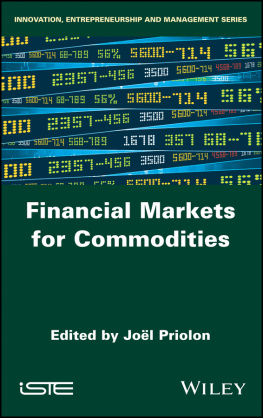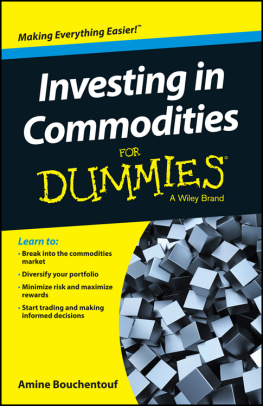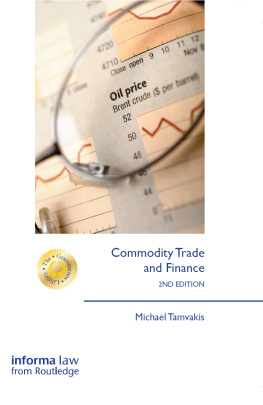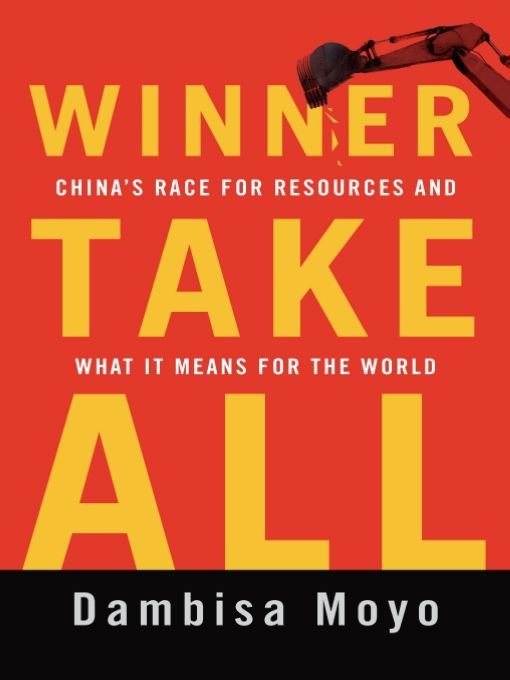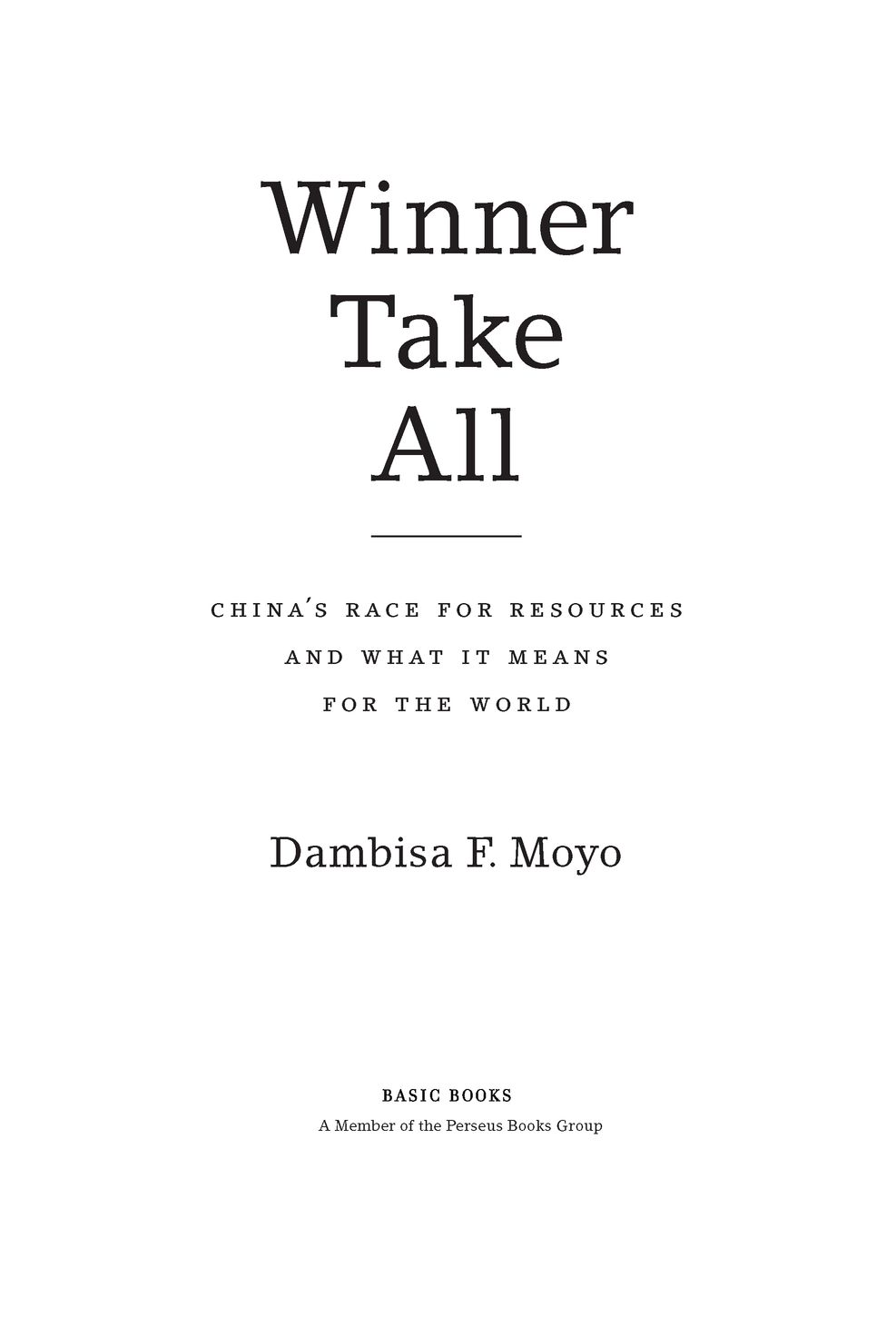Table of Contents
List of Tables
ALSO BY DAMBISA MOYO
How the West Was Lost
Dead Aid
If we shrink from the hard contests where men must win at
hazard of their lives and at the risk of all they hold dear,
then the bolder and stronger peoples will pass us by and
will win for themselves the domination of the world.
THEODORE ROOSEVELT
The Strenuous Life, 1899
Always pray that your opposition be wicked.
In wickedness there is a strong strain toward rationality...
If good intentions are combined with stupidity,
it is impossible to outthink them.
MARION J. LEVI JR.
Nine Laws for the Disillusionment of the True Liberal, 1970
Introduction
IN THE SUMMER OF 2007 a Chinese company bought a mountain in Peru. More specifically, it bought the mineral rights to mine the resources contained in it. At fifteen thousand feet (forty-six hundred meters), Mount Toromocho is an imposing landmassmore than half the height of Mount Everest. It contains two billion tons of copper, one of the largest single copper deposits in the world. For a hefty fee of US$3 billion, Mount Toromochos title transferred from the Peruvian people to the hands of the Chinese.
Chinas commodity campaign is breathtaking. In just over a decade China has risen from relative insignificance to pole position in underwriting numerous resource-related transactions across the globe. Chinas Chinalco, the company that bought the rights to exploit the Peruvian mountain, also spent nearly US$13 billion in 2008 for a stake in Australias aluminum sector. In June 2009 Sinopeca leading Chinese petrochemical companypurchased Addax Petroleum, which has sizeable assets in Iraq and Nigeria, for US$7.2 billion. Sinopec also bought a 40 percent stake in the Brazilian arm of Rep-sol, a Spanish energy company, for US$7 billion in October 2010 and part ownership in a joint-venture oil company with Russias Rosneft (a leading oil and gas company) for US$3.5 billion in June 2006.
Collectively, these inputs used to produce goods and services are known as commodities, and commodities permeate every aspect of modern daily living: the energy that powers cars, trucks, and electricity grids; water for the sustenance of all life forms; arable land that yields grains and other foodstuffs; and a long list of minerals used in everything from mobile telephony to television screens and as inputs to all sorts of machinery.
Little wonder that headline writers and media commentators telegraph warnings of impending doom in the commodity spaceconflicts spurred by shortages of arable land, clashes over water, and the risks of political Armageddon as global demand for energy outstrips supply. Yet for all the importance of commodities and the markets in which they trade, our knowledge of this essential component of the global economythe largest asset class in the worldremains blurry at best.
Winner Take All explores the commodity dynamics that the world will face over the next several decades that almost certainly will be characterized by global tensions arising from greater resource scarcity. More specifically, it is about the mechanics and implications of Chinas rush for resources across all regions of the world. Of all the worlds great powers, only one, China, has focused its economic and political strategy on anticipating the considerable challenges presented by a resource-scarce future. But more than this, Winner Take All is a clarion call to the rest of the world, which remains largely ill prepared for the challenges of resource scarcity and the evolving dynamics around Chinas central role. This despite the well-reasoned arguments laid out by one of the worlds foremost and renowned commodities experts, Jim Rogers, on the importance of resources in his book, Hot Commodities, nearly a decade ago.
What is at stake? At a minimum, acute resource scarcity will lead the world into a period when the average prices for commoditiesarable land, water, minerals, and oilwill skyrocket to permanently higher levels. Food at supermarkets (bread from wheat and grains as well as sugar, meat, milk, etc.), water from taps, mobile phones and cars, gasoline at the pumps, and many of the other daily costs of life will be substantially higher. And higher prices will, inevitably, lead to worsening living standards across the world.
In the extreme case, as resource scarcity becomes more biting, commodity shortages could lead to outright war. As we discuss later, since 1990 at least eighteen violent conflicts around the worldmany of them ongoinghave had their origins in resource shortages and access. Beyond this, numerous other countries in commodity-scarce regions, such as the water-scarce Middle East or parts of Asia with relatively little arable land per person, are vulnerable to violence and clashes. Here and elsewhere populations inhabit a delicate balance between substantial demand and supply shortages. The looming risk, of course, is that many more countriesand thus many more peoplewill be drawn into the fray.
This is the context in which Chinas resource campaign is taking place. Chinas global charge for hard commodities (metals and minerals that are mined or extracted), soft ones (typically grown goods, such as timber, grains, and other foodstuffs), and the infrastructure (roads, ports, and railways) that support and facilitate their extraction and delivery, is meant to guarantee the continuation of its already remarkable story of economic development. To that end, the Chinese appear determined to pull all available levers, and because Chinas resource undertaking is global and among the most aggressive in history, it has economic consequences for us all.
THIS BOOK TACKLES three broad themes.
First, it examines the economic implications of Chinas ascendancy as the lead buyer of the worlds resources, set in the context of global commodity supply and demand. China is now the main trading partner of many of the most influential economies in both the developed and the developing world. In just a few short decades it has become the most sought-after source of capital infusions. Indeed, rich countries and poor alike do not just wait for China to come calling; they actively court and seek out Chinese investments.
China now funds foreign governments (providing loans and buying their bonds), underwrites schools and hospitals, and pays for infrastructure projects such as roads and railways (particularly across the poorest parts of the world), catering to the needs of the host nations and making China an altogether more attractive investor than international bodies such as the World Bank, which often tie loans to harsh policy restrictions. Chinas economic influence on places as far-flung as the United States, Africa, Eastern Europe, Australia, and South America is incalculable. Chinas increasing global influence has mirrored its economic rise and, invariably, a concomitant rise in its demand for resources.
Second, this book is about Chinas growing financial reach and its implications for the workings of the global commodity markets. Over time and across the gamut of commodities (minerals and oil markets and even nonpublicly traded assets such as land), China has become the marginal buyer, purchasing global resources in such disproportionate volume that it increasingly has price-setting power, which automatically influences how markets trade as well as helping determine the value of assets in host countries. Thus, gleaning the ramifications of Chinas involvement in setting resource prices and influencing whether market prices move up or down is crucial.


